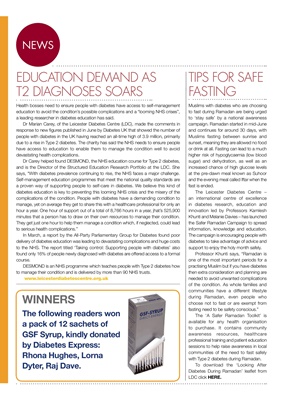
NEWS
HAVE A SAFE
RAMADAN
Muslims with diabetes who are choosing
to fast during Ramadan are being urged
to 'stay safe' by a national awareness
campaign. Ramadan started in mid-June
and continues for around 30 days, with
Muslims fasting between sunrise and
sunset, meaning they are allowed no food
or drink at all. Fasting can lead to a much
higher risk of hypoglycaemia (low blood
sugar) and dehydration, as well as an
increased chance of high glucose levels
at the pre-dawn meal known as Suhoor
and the evening meal called Iftar when the
fast is ended.
The Leicester Diabetes Centre -
an international centre of excellence
in diabetes research, education and
innovation led by Professors Kamlesh
Khunti and Melanie Davies - has launched
the Safer Ramadan Campaign to spread
information, knowledge and education.
The campaign is encouraging people with
diabetes to take advantage of advice and
support to enjoy the holy month safely.
Professor Khunti says, "Ramadan is
one of the most important periods for a
practising Muslim but if you have diabetes
then extra consideration and planning are
needed to avoid unwanted complications
of the condition. As whole families and
communities have a different lifestyle
during Ramadan, even people who
choose not to fast or are exempt from
fasting need to be safety conscious."
The 'A Safer Ramadan Toolkit' is
available for any health organisation
to purchase. It contains community
awareness resources, healthcare
professional training and patient education
sessions to help raise awareness in local
communities of the need to fast safely
with Type 2 diabetes during Ramadan.
To download the 'Looking After
Diabetes During Ramadan' leaflet from
LDC click HERE.
Health bosses need to ensure people with diabetes have access to self-management
education to avoid the condition's possible complications and a "looming NHS crises",
a leading researcher in diabetes education has said.
Dr Marian Carey, of the Leicester Diabetes Centre (LDC), made the comments in
response to new figures published in June by Diabetes UK that showed the number of
people with diabetes in the UK having reached an all-time high of 3.9 million, primarily
due to a rise in Type 2 diabetes. The charity has said the NHS needs to ensure people
have access to education to enable them to manage the condition well to avoid
devastating health complications.
Dr Carey helped found DESMOND, the NHS education course for Type 2 diabetes,
and is the Director of the Structured Education Research Portfolio at the LDC. She
says, "With diabetes prevalence continuing to rise, the NHS faces a major challenge.
Self-management education programmes that meet the national quality standards are
a proven way of supporting people to self-care in diabetes. We believe this kind of
diabetes education is key to preventing this looming NHS crisis and the misery of the
complications of the condition. People with diabetes have a demanding condition to
manage, yet on average they get to share this with a healthcare professional for only an
hour a year. One hour of support out of a total of 8,766 hours in a year, jhat's 525,900
minutes that a person has to draw on their own resources to manage their condition.
They get just one hour to help them manage a condition which, if neglected, could lead
to serious health complications."
In March, a report by the All-Party Parliamentary Group for Diabetes found poor
delivery of diabetes education was leading to devastating complications and huge costs
to the NHS. The report titled 'Taking control: Supporting people with diabetes' also
found only 16% of people newly diagnosed with diabetes are offered access to a formal
course.
DESMOND is an NHS programme which teaches people with Type 2 diabetes how
to manage their condition and is delivered by more than 90 NHS trusts.
www.leicesterdiabetescentre.org.uk
EDUCATION DEMAND AS
T2 DIAGNOSES SOARS
The following readers won
a pack of 12 sachets of
GSF Syrup, kindly donated
by Diabetes Express:
Rhona Hughes, Lorna
Dyter, Raj Dave.
WINNERS